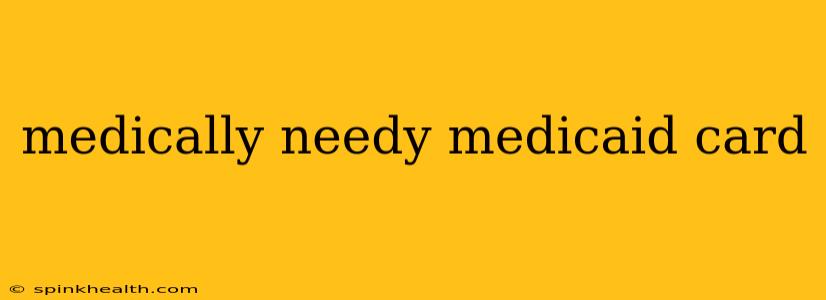The path to affordable healthcare can be a winding road, especially for those facing significant medical expenses. For many, the lifeline to essential medical services is Medicaid, a government-funded program designed to assist low-income individuals and families. But what happens when your income is slightly above the standard Medicaid eligibility threshold, yet you're still struggling to afford necessary medical care? This is where the concept of "medically needy Medicaid" comes into play. This isn't a separate program, but rather a provision within Medicaid that broadens access for those with significant medical bills. Let's unravel the complexities of medically needy Medicaid and discover how it can provide a crucial safety net.
What is Medically Needy Medicaid?
Imagine this: you're working hard, but a serious illness or injury leaves you with crushing medical debt. Your income is too high for standard Medicaid, but your medical expenses are so substantial that you're effectively impoverished. Medically needy Medicaid recognizes this difficult situation. It allows individuals and families who would otherwise exceed income limits to qualify for Medicaid coverage if their medical expenses reduce their income below the program's eligibility threshold. Essentially, it's a way to account for the significant financial burden of illness.
How Does Medically Needy Medicaid Work?
The mechanics of medically needy Medicaid vary slightly from state to state. However, the core principle remains consistent. States establish a "spend-down" process. This involves calculating your income and subtracting your allowable medical expenses. If the resulting amount falls below the Medicaid income limit, you may qualify for coverage. These allowed medical expenses typically include doctor visits, hospital stays, prescription drugs, and other necessary treatments.
What are the Income and Resource Limits for Medically Needy Medicaid?
This is where things get specific to each state. There's no single national standard. Income and resource limits for medically needy Medicaid are determined at the state level. This means you need to contact your state's Medicaid agency directly to determine the specific requirements in your area. Their website or a phone call will be your best resources for obtaining up-to-date information.
How Do I Apply for Medically Needy Medicaid?
The application process is similar to applying for regular Medicaid, though it may involve extra steps to document your medical expenses. You'll need to provide detailed financial information, including income statements, bank statements, and records of all medical bills. Again, your state's Medicaid agency is your best resource for application instructions and necessary documentation.
What are the Differences Between Regular Medicaid and Medically Needy Medicaid?
The primary difference is the income qualification. Regular Medicaid adheres to stricter income limits. Medically needy Medicaid allows those with higher incomes to qualify, provided they meet the spend-down requirements. Both programs offer similar healthcare coverage once eligibility is established.
Is Medically Needy Medicaid the Same in Every State?
No, the rules governing medically needy Medicaid vary significantly between states. Some states have more generous programs than others. Some may not even offer medically needy Medicaid. This emphasizes the importance of contacting your state's Medicaid agency for accurate and up-to-date information.
What if I am Denied Medically Needy Medicaid?
If your application is denied, understand that you have the right to appeal the decision. Carefully review the reasons provided for the denial and gather any additional documentation that might support your case. Your state's Medicaid agency should have a clear appeals process outlined on their website or available by phone.
Navigating the complexities of medically needy Medicaid can be daunting. Remember, persistent effort and clear communication with your state's Medicaid agency are key to successfully accessing this vital healthcare safety net. Don't hesitate to seek assistance from consumer advocates or healthcare navigators if needed. They can provide invaluable support in understanding the process and completing the application.

